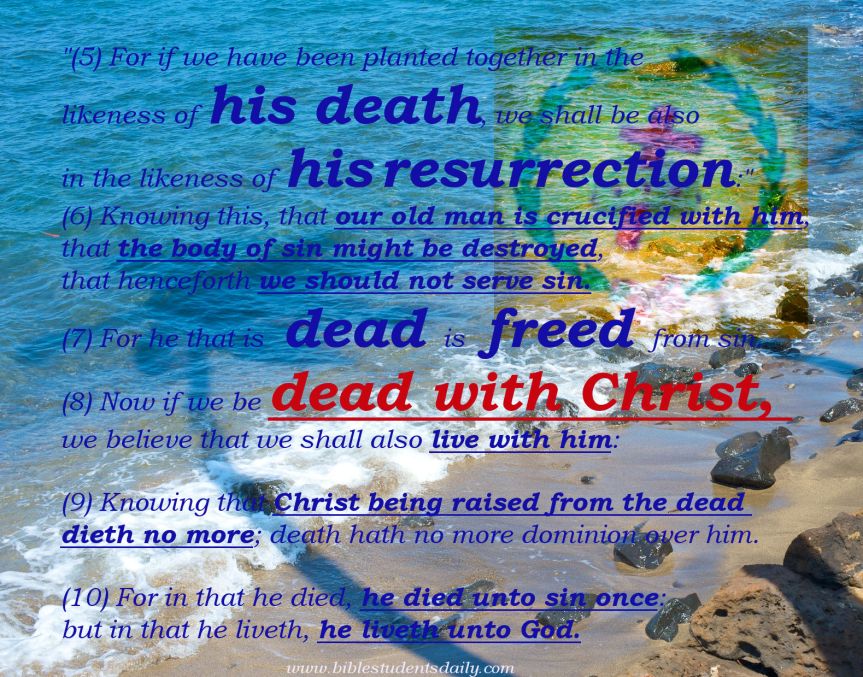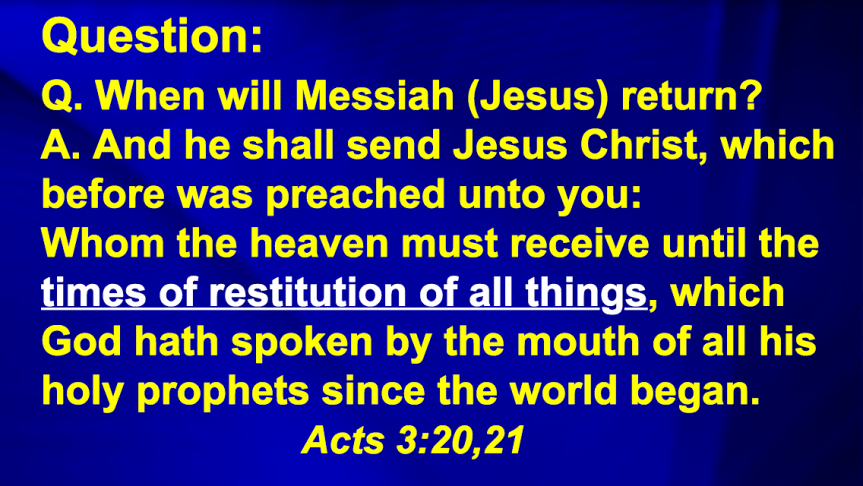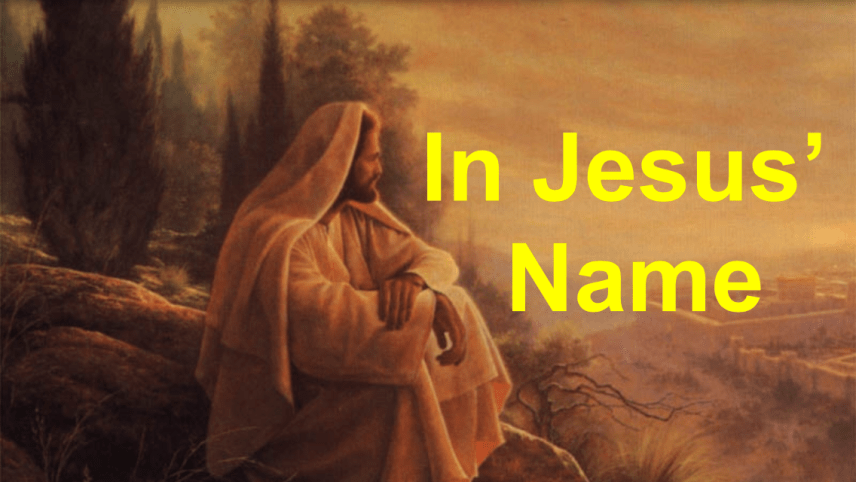
“For if we have been planted together in the likeness of his death, we shall be also in the likeness of his resurrection.” Romans 6:5
Call to mind now what was the likeness of his resurrection. It was an exceeding high exaltation, far above the human nature, “far above all principality and power and might and dominion, and every name that is named” (Ephesians 1:21). It was an exaltation even to the Divine nature, of which, says Peter, we also, who follow his steps as he set us an example, may become partakers (2 Peter 1:4). To follow in the Lord’s steps of humiliation and sacrifice, even unto death, is no light undertaking. It means the giving up of our will for the accomplishment of the Divine will. R.1262, c.2, p.4.
Reprint No. 1262-1263 of the Original Watchtower & Herald of Christ’s Presence
FAVOR UPON FAVOR.
“Therefore, being justified by faith, we have peace with God through our Lord Jesus Christ: by whom, also, we have access by faith into this grace wherein we stand and rejoice in hope of the glory of God.” Romans 5:1,2
In the October issue of the TOWER we took a hasty view of God’s great favor, which all the world may enjoy, of justification through Christ. We saw what a blessed, full salvation, full restitution to all that was lost in Adam, is implied in that term justification. And while we do not now experience that justification in the actual restoration to perfection—mental, moral and physical; while we still suffer, from the fall, many weaknesses and sad deformities of character and person, while we are still subject to death and must sooner or later sink under its power; nevertheless, having by faith accepted the promise of actual justification, through Christ, we have peace with God; for we hold in our possession, so to speak, a check on the bank of heaven for full salvation, justification or restitution, payable to the bearer in God’s due time—the Millennial age. And, therefore, we reckon ourselves, as God reckons us, justified freely from all things, our shortcomings being no longer imputed to us, being atoned for by the precious blood wherein we trust, and the righteousness of Christ counted to us.
Our sins were laid upon Christ, our Redeemer, and his righteousness is transferred correspondingly to our account. O how we have rejoiced over these checks when by faith we received them and began to realize their import! How often we have opened the blessed book of God and read that check over and over again—“God so loved the world that he gave his only begotten Son, that whosoever believeth in him [Ah! that includes me, we said] should not perish, but have everlasting life.” (John 3:16.) Some of us shouted over it, and some of us wept over it tears of joy and gratitude. And for this grace we will never cease to praise God through all eternity.
But now we want to consider this additional favor or grace of which the Apostle speaks, into which, also, we have access by faith in Christ, and in which those who have received it rejoice in hope of the glory of God—this, which some Christians call “the second blessing,” but which we regret to say many such but vaguely comprehend. What is it? Can there be anything grander than what we have seen the grace of justification to be? anything more desirable than the pardon of our sins and our reconciliation and peace with God? Can there be anything more desirable than the outcome of this reconciliation in the perfection of every physical, mental and moral power? than a body in the glow of health and beauty of form and feature, forever decked with the bloom of eternal youth? than a mind in full possession of all its powers, and trained, educated and disciplined beyond the range even of all the intellectual prodigies we have ever known? and a moral refinement gloriously reflecting the divine likeness and perfectly acceptable to God? Can there be any desirable grace beyond this and the perfect condition of the glorious earth whose now desert places shall then blossom as the rose?
From a human standpoint it would seem not. Surely this is all the human heart could wish for or aspire to. And when “God shall wipe away all tears, and there shall be no more death, neither sorrow, nor crying, neither shall there be any more pain,” surely all who love righteousness will be satisfied, and, as Isaiah says, “the whole earth shall break forth into singing.” (Isa. 14:7.) Praise the Lord! the prospect even now puts a new song into our mouths. But notwithstanding all this we learn that God has provided “some better thing” for the Gospel church. Paul speaks of this when, after recounting the faith and good works of the ancient worthies who lived previous to the Gospel age, and hence previous to the special call of this age, he says, “These all, having obtained a good report through faith, received not [yet] the promise, God having provided some better thing for us, that they without us should not be made perfect.”—Heb. 11:40.
And it is concerning this that we read the expressions, “favor upon favor” (John 1:16. Diaglott), “exceeding great and precious promises,” “the prize of our high calling,” “the heavenly calling,” etc. This high calling is a call to joint-heirship with Christ as his bride, to be partakers of his divine nature, to share his likeness, and glory, and honor, and to be associated as co-workers together with him in his high office, when, at the appointed time, his Kingdom shall come—even to sit with him in his throne as kings and priests unto God. See Rom. 8:17; 2 Pet. 1:4; 1 John 3:2; Rev. 3:21; 1:6.
The human mind staggers in its endeavor to comprehend such a height of glory; yet those whose hearts are deeply in love with the Lord can appreciate the exceeding favor of the invitation to be the beloved bride of Christ, to be made like him and to be in his glorious presence forever. Amazing grace! and the wonder grows when we reflect upon the high exaltation of Christ, even beyond the glory which he had with the Father before the world was—a glory of person which is “the express image of the Father’s person” (Heb. 1:3), a glory of wealth which places the whole universe at his feet as “the Heir of all things” (Heb. 1:2), a glory of power, of “all power in heaven and on earth,” a glory of office, too, which is second only to that of Jehovah, the great Emperor of the Universe (1 Cor. 15:27,28), and a glory of character which shines with all the luster of unsullied purity.
To aspire to such a height of glory without invitation would indeed be the height of presumption and folly. But when invited to it, it is our privilege to accept the favor with thanksgiving and humble endeavor to fulfill the conditions of the call. This is the high privilege of the saints of the Gospel age; but strait is the gate and narrow is the way that leadeth unto it, and few there be that find it.—Matt. 7:14.
Paul shows us that through Christ we have access by faith into this grace, even as through him also we by faith had access to the grace of justification. He also shows that before we have access to this grace we must have received the grace of justification. Then, believing that “faithful is he that hath called us, who also will do it,” and fully relying on his grace, we earnestly seek to know and fulfill the conditions. These conditions, those especially who are fully consecrated to God, are anxious to learn. And such have already taken the first steps, at least, in fulfilment of the conditions. We have already accepted thankfully the grace of justification, by faith in Christ our Redeemer; and this gives us a reckoned standing in God’s sight. That is, we are henceforth reckoned as holy, as though actually justified, and treated from that standpoint. The Apostle says we are “holy and acceptable to God.” (Rom. 12:1.) And being thus justified, holy (through Christ’s imputed righteousness), and therefore acceptable to God, he says: “I beseech you, therefore, brethren, by the mercies of God [manifested in the grace which justified you], that ye present your bodies a living sacrifice,…which is your reasonable service.” (Rom. 12:1.) There is the condition of the high calling, briefly stated—That we present our bodies, our justified humanity, a living sacrifice. And you will remember that this is just what our Lord Jesus did, saying, “A body hast thou prepared me. In burnt offerings and sacrifices for sin thou hast had no pleasure. Lo, I come (in the volume of the book it is written of me) to do thy will, O God.” (Heb. 10:5-7.) As he offered his life a sacrifice for sin, so we are invited to sacrifice our life faithfully, unto death, as he did; and in so doing we are counted in with him as part of the sin-offering, though our sacrifice would have no merit whatever of itself, because apart from him we ourselves would be under condemnation. But being first justified by faith in him, we are acceptable sacrifices to God, as the Apostle states. And in this privilege of sacrificing ourselves now consists the special advantage of justification by faith during the present age, rather than in the future.
In fulfilling the condition of the high calling, then, we will be doing just what Jesus did, remembering that he left us an example that we should follow his steps. (1 Pet. 2:21.) Remember, too, the Apostle’s words—“If we be dead with him, we shall also live with him; if we suffer, we shall reign with him.” “If we have been planted together in the likeness of his death, we shall be also in the likeness of his resurrection.”—2 Tim. 2:11,12; Rom. 6:5.
Call to mind now what was the likeness of his resurrection. It was an exceeding high exaltation (Phil. 2:9), far above the human nature, “far above all principality and power and might and dominion, and every name that is named.” (Eph. 1:21.) It was an exaltation even to the divine nature, of which, says Peter, we also, who follow his steps as he set us an example, may become partakers. (2 Pet. 1:4.) To follow in the Lord’s steps of humiliation and sacrifice, even unto death, is no light undertaking. It means the giving up of our will for the accomplishment of the divine will. Our sacrifice is not the giving up of our sins: those we fully renounced when we received the grace of justification, before we were acceptable as sacrifices. Our sacrifice must, therefore, consist in our self-denial of those things to which as natural men we have a right. Our first consideration in all that we do must be, What will be most to the glory of God and the advancement of his cause.
If we realize that we can glorify God somewhat by one course at slight inconvenience or expense of our own will, and yet more by another course of greater expense [R1262 : page 6] or humiliation, then the latter is the one to which we are committed by our consecration. [R1263 : page 6]
Amidst the noisy clamorings of our old (human) nature, insisting on its own will and way, to some extent, at least, it is often difficult to even discover the right course in view of our consecration. But persistently to silence the old nature, and studiously to search and determine the will of the Lord in all that we do, is the finding of the “narrow way” that leads to life—to that divine life to which the saints of this age are called. “And few there be that find it,” says the Lord. How few even of those who made the covenant seem thus to studiously search for the way and humbly to walk in it.
“Oh! ’tis a pathway rough to choose,
A struggle hard to share,
For human pride would still refuse
The nameless trials there.
“But though we know the gate is low
That leads to heavenly bliss,
What higher grace could God bestow
Than such a hope as this?”
There is only one way for any to do who would keep in this narrow way of sacrifice even unto death, and that is what Paul directs, “Forgetting those things which are behind, and reaching forth unto those things which are before, to press toward the mark for the prize of the high calling of God in Christ Jesus”—”lay aside every weight and the sin which doth so easily beset us, and run with patience the race that is set before us, looking unto Jesus, the author and finisher of our faith,” and considering him, how he endured, lest we be wearied and faint in our minds. (Phil. 3:13; Heb. 12:1-3.)
If we keep looking at the things behind, we lose sight of the heavenly things and begin to over-estimate the earthly, and to correspondingly discount the heavenly. In other words, we begin to be conformed to this world. The Apostle says, “Be ye not conformed to this world, but be ye transformed;” let your minds be continually turned heavenward.
However difficult and thorny the path may be, forget not the privilege of walking in it. We may not repine and wish it were otherwise; for he that putteth his hand to the plow, and looketh back, is not fit for the kingdom. (Luke 9:62.) If our Lord had to be so severely tested to prove his worthiness of high exaltation, we should not think it strange concerning the fiery trial which is to try us, as though some strange thing had happened unto us. (1 Pet. 4:12.) We must “endure hardness as good soldiers,” and wait patiently for “the glory which shall be revealed in us.“ And for our encouragement let us bear in mind the exceeding great and precious promises:—“To him that overcometh will I grant to sit with me in my throne, even as I overcame and am set down with my Father in his throne;” “Be thou faithful unto death, and I will give thee a crown of life;” “Fear not, little flock; it is your Father’s good pleasure to give you the kingdom;” “Faithful is he that calleth you, who also will do it.” Glorious, indeed, will be that second blessing when fully realized; and even now, as by faith the prospect of its inheritance looms up before us, we rejoice with joy unspeakable and full of glory, reckoning that the sufferings of this present time, for Christ’s sake, are not worthy to be compared with the glory which shall be revealed in us.
—————
2 Peter 1: 1-15 (KJV)
1Simon Peter, a servant and an apostle of Jesus Christ, to them that have obtained like precious faith with us through the righteousness of God and our Saviour Jesus Christ:
2 Grace and peace be multiplied unto you through the knowledge of God, and of Jesus our Lord,
3 According as his divine power hath given unto us all things that pertain unto life and godliness, through the knowledge of him that hath called us to glory and virtue:
4 Whereby are given unto us exceeding great and precious promises: that by these ye might be partakers of the divine nature, having escaped the corruption that is in the world through lust.
5 And beside this, giving all diligence [earnest and persistent application of effort], add to your faith virtue; and to virtue knowledge;
6 And to knowledge temperance; and to temperance patience; and to patience godliness;
7 And to godliness brotherly kindness; and to brotherly kindness charity.
8 For if these things be in you, and abound, they make you that ye shall neither be barren nor unfruitful in the knowledge of our Lord Jesus Christ.
9 But he that lacketh these things is blind, and cannot see afar off, and hath forgotten that he was purged from his old sins.
10 Wherefore the rather, brethren, give diligence to make your calling and election sure: for if ye do these things, ye shall never fall:
11 For so an entrance shall be ministered unto you abundantly into the everlasting kingdom of our Lord and Saviour Jesus Christ.
12 Wherefore I will not be negligent to put you always in remembrance of these things, though ye know them, and be established in the present truth.
13 Yea, I think it meet, as long as I am in this tabernacle, to stir you up by putting you in remembrance;
14 Knowing that shortly I must put off this my tabernacle, even as our Lord Jesus Christ hath shewed me.
15 Moreover I will endeavour that ye may be able after my decease to have these things always in remembrance.
This post’s URL:
https://biblestudentsdaily.com/2018/08/31/romans-65-a-precious-very-great-promise/





























